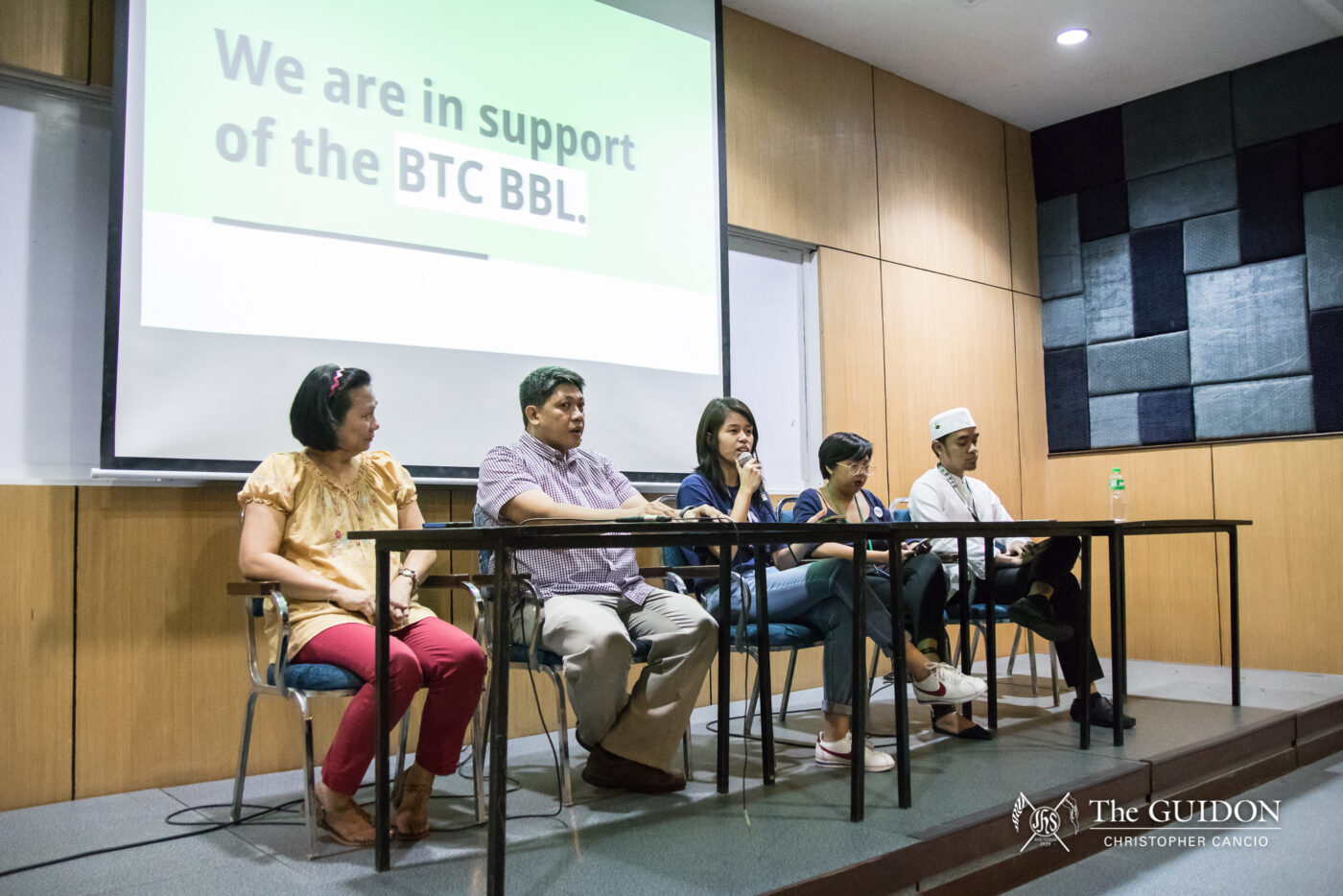SEVERAL ATENEO institutions formed Task Force: Bangsamoro Basic Law (TF:BBL) to increase public pressure in expediting the passage of the Bangsamoro Basic Law for marginalized Muslims in Mindanao.
The Sanggunian, the Ateneo Assembly, Development Society of the Ateneo (DevSoc), and Simbahang Lingkod ng Bayan (SLB) are among the institutions involved in the initiative
If passed, the BBL seeks to abolish and replace the existing Autonomous Region in Muslim Mindanao, described by the past administration as a “failed experiment.”
TF:BBL consists of the Lobbying Team, Research and Mapping Team, and Communications Team.
The Lobbying Team will work on setting appointments with members of Congress to engage in direct discourse.
Meanwhile, Research and Mapping Team will assist the Lobbying Team by conducting research, political mapping, and disseminating information on the state of affairs in the Bangsamoro region as well as the law’s progress in Congress.
The Communications Team will handle the information dissemination and awareness campaign in campus, and contact Congress members, bill proponents, and the Bangsamoro people.
The task force supports the official statement for the BBL’s passage released by the five Ateneo Presidents on March 16, as well as Ateneo de Davao and Salaam Youth Movement’s statement formulated during the 1st Bangsamoro Youth Caucus last September 15, 2017.
TF:BBL is vying for the passage of the BBL through Congress before it officially adjourns on June 1.
President Rodrigo Duterte assured the passing of the BBL within 2018 to “meet the deadline,” as he had promised to the Moro Islamic Liberation Front (MILF).
Significance
A TF:BBL press conference was held at Faura AVR on March 16 where the student body and external partner institutions expressed their formal positions.
Present in the press conference were Sanggunian President Ia Marañon, Salaam Youth Movement President Datu Amir Wagas, Ateneo de Manila’s Buklod Atenista Ambassador Bianca Velasco, SLB representative Pat Falguera, SJ, and John J. Carroll Institute on Church and Social Issues (JJCICSI) representative Gemma Marin.
Wagas mentioned how “the BBL reflects the views, values, and aspirations of the indigenous of Mindanao [and how] Moros are fighting for it [because it is for] the poorest of poor, neglected, and marginalized.”
Falguera spoke on behalf of the Society of Jesus Social Apostolates (SJSA) who partnered with the Jesuit Higher Commission and the Ateneo in issuing a statement in support of the BBL.
Marin added that this enhanced version of the BBL is closest to the genuine Muslim aspirations of justice, economic growth and social equity. “Let this social justice no longer be postponed,” she urged.
Issue of awareness
The task force members emphasized how students have a stake in the policy process and urged the active participation of the student body.
In an interview with The GUIDON, Marañon expressed dismay on the lack of discourse on the BBL.
“Nawala siya sa national consciousness—and that’s not entirely our fault. [The] media stopped covering it (It has disappeared from national consciousness—and that’s not entirely our fault. [The] media stopped covering it),” she added.
She also explained the difficulty to reach such efforts to younger people while also recognizing a gap between them by asking, “How do you even start talking about BBL when it’s so far removed from our reality here in Metro Manila?”
Among the efforts of the task force is the creation of a 52-page packet posted by The Ateneo Assembly on their Facebook page. The packet defined what BBL is and its implications on the lives of Bangsamoro people.
The packet features a timeline of the BBL, a general outline of the proposed bill, its provisions in terms of territory, the general principles of its government, and salient points on human rights and social justice.
In addition, it also debunks several misconceptions about the Bangsamoro and its people, including the myth that the Bangsamoro aims to be an independent state, when in fact, the BBL only proposes to give them autonomous power within the government.
In order to realize plans on externalization, Ateneo organizations partnered with groups like SJSA and Gaston Z. Ortigas Peace Institute (GZO).
The task force is currently working on increasing awareness and encouraging support from the student body, while continually contacting policymakers to increase public pressure on the process.
State of the BBL
BBL proposes to establish a distinct political entity for Bangsamoro people. With the law in place, they would be allowed a greater chance at charting their political and economic future through a democratic process, as stated in Article I, Section 3 of the proposed BBL.
Should the BBL be passed, the Bangsamoro people will be given an opportunity for a more secure, and self-determined future. Since former president Benigno Aquino III’s submission of the first draft to Congress in 2014, BBL has been shelved and put off several times, delaying its approval.
The bill was filed to the 16th Congress, but Congress decided that the bill be put on hold in the aftermath of the Mamasapano clash on January 25, 2015, wherein due to demand for arrest of the Moro Islamic Liberation Front’s involvement in the death of 44 Special Action Force (SAF) commandos during the Mamasapano Clash on January 25, 2015.
The Congress went on recess without approving the bill, despite the Aquino administration’s support.
As of writing, the bill has already been passed by a House Joint Committee tackling the measure. The Senate is seeking to pass its version of the BBL by May 23, according to Senator Juan Miguel Zubiri.
Senate President Aquilino Pimentel III and Senate Majority Leader Vicente Sotto III are also slated to meet with Duterte, along with the proponents of the BBL, before June 1 to discuss Congress’ timetable.







